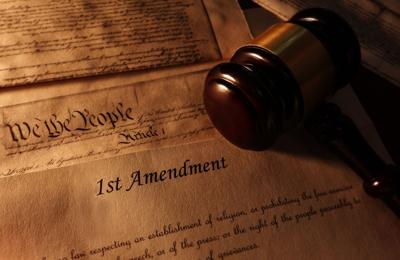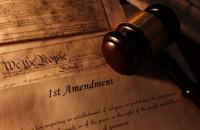All over the country, houses of worship have done the right thing by suspending services to save lives in the fight against COVID-19.
Meanwhile, state authorities are breaking the law by forbidding gatherings among a minority of faith groups that continue to assemble. In the war on COVID-19, they believe the free exercise of religion is unimportant and no longer the law. They feel authorized to punish worship and prayer. Examples:
• Authorities arrested eight prayerful abortion protesters Saturday outside an abortion clinic in Charlotte, N.C., for defying the state’s order to stay at home for anything other than essential outings.
• Authorities arrested Pastor Rodney Howard-Browne for holding two church services in Tampa, Fla., on charges of “unlawful assembly” in violation of the governor’s “safer-at-home” order. Despite that arrest, Florida Gov. Ron DeSantis questions the state’s authority to interfere with a church.
• Authorities arrested Pastor Tony Spell for holding services near Baton Rouge, La.
• San Francisco authorities last week issued their first citation for a violation of the stay-at-home order to Ron Konopaski. The 86-year-old grandfather was alone outside a Planned Parenthood praying and suggesting alternatives to abortion.
• Police in Lodi, Calif., threaten to arrest Pastor Jon Duncan for holding worship services.
In Colorado Springs, Pastor Rose Banks flouted the state’s stay-at-home order by holding regular Sunday services. When Gov. Jared Polis found out, he did the right thing. He updated his stay-at-home order, which contained an all-secular list of exceptions, to exempt “houses of worship” if they exercise extreme social distancing. The law gave him no real choice.
The vast majority of religious leaders have suspended services voluntarily. All three Catholic dioceses in Colorado did so before the stay-at-home order. It was the right thing to do. Nearly all religions tell us to respect civil authority and make decisions in the best interests of our neighbors and society.
Everyone on American soil should exercise their civil liberties with self-restraint, for the sake of preserving them and maintaining social order. We have the right to sport swastika tattoos, but it does not mean we should.
While it is a good idea for churches to forgo gatherings until the virus runs its course, it cannot be a mandate. State officials cannot use the virus as a reason to punish a pastor for preaching or a grandfather for advocating abortion alternatives.
The law on this is clear. From the Law Library of Congress:
“The First Amendment of the United States Constitution prohibits the United States Congress from enacting legislation that would abridge the right of the people to assemble peaceably. The Fourteenth Amendment to the United States Constitution makes this prohibition applicable to state governments.”
The First Amendment expressly prevents the government from interfering in the “free exercise” of “religion.” Although the freedom to assemble and communicate applies to all individuals and groups, the First Amendment does not single out abortion clinics or other businesses for protection. If the Constitution considers anything a “critical” gathering, it is one involving religion.
Nothing in the Constitution implies a virus exemption from the First and Fourteenth Amendments.
Although Polis clearly understands and respects religious liberty, his colleagues in other states do not. They allow people to gather in the lobbies of abortion providers because “elective” abortions are “critical,” even though we must forgo other elective procedures to preserve masks, gowns and medical equipment for coronavirus patients.
If it is “peaceable” to assemble in the lobby of a clinic, it is “peaceable” to assemble for prayer outside.
Stay-at-home orders exempt gatherings at pet stores as “critical” or “essential.” Commercial airline trips, in which people transfer the virus from one region to another: critical. Liquor stores: critical. Pot sales: critical.
Religious leaders should suspend services to help fight the virus, even for the highest Christian holiday of Easter. The state should recommend this action. It cannot force it, even in times of crisis. Doing so assaults the First Amendment.
The Gazette Editorial Board




 Your Privacy Choices
Your Privacy Choices